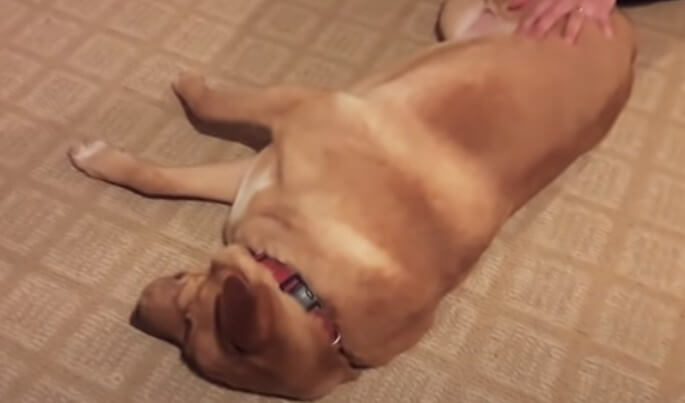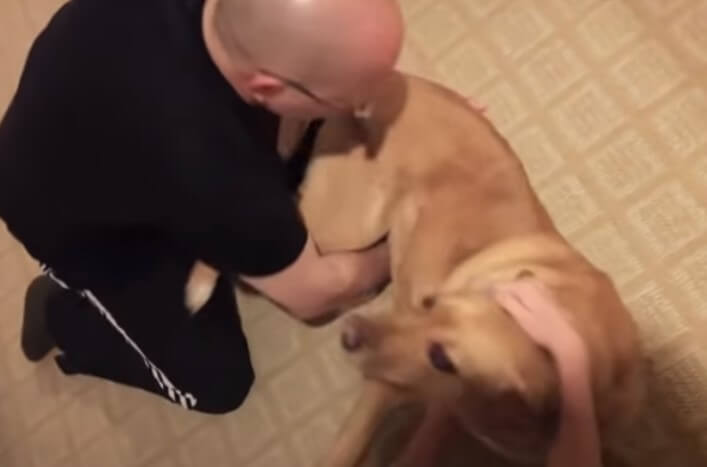Yes, it is normal for a dog’s back to crack. When they stretch or move, the spinal joints in their back can make cracking sounds, similar to when we crack our knuckles.
This is usually not a cause for concern and is a natural part of their movement.
However, if you notice your dog experiencing pain, stiffness, or difficulty in movement along with the cracking sound, it’s best to consult a veterinarian to rule out any underlying medical condition.
Regular exercise, a balanced diet, and maintaining a healthy weight can help reduce the risk of joint problems in dogs. Remember, a crack sound alone is normal, but any accompanying symptoms should be addressed by a professional.
Understanding Dog Back Cracking
Is It Normal for My Dogs Back to Crack
You may have noticed a strange cracking sound coming from your dog’s back and wondered if it’s normal or something to be concerned about.
While it may sound alarming, dog back cracking is actually quite common and usually harmless. Understanding why it happens can help put your mind at ease.
So, let’s explore the anatomy of a dog’s spine and why their back may crack.
What Causes The Cracking Sound In A Dog’s Back?
- The cracking sound you hear is often caused by the movement of joints in the spine. When your dog twists, stretches, or moves in certain ways, the joints in their back can create a popping or cracking noise. It’s similar to the cracking sound that can occur when you crack your knuckles.
Exploring The Anatomy Of A Dog’s Spine
- A dog’s spine is made up of a series of bones called vertebrae. These bones run from the base of the skull all the way to the tip of the tail. In between each vertebra are small, fluid-filled discs that act as cushions. These discs allow for flexibility and movement in the spine.
- Surrounding the vertebrae are ligaments, which connect the bones together and provide support. The ligaments help to stabilize the spine and allow for controlled movement.
The Role Of Joints And Ligaments In The Back
- Joints in a dog’s back, known as facet joints, are responsible for the cracking sound. These joints allow for movement and flexibility in the spine. When your dog moves, these joints can sometimes shift or realign, resulting in the cracking noise.
- Ligaments play a crucial role in supporting the spine and preventing excessive movement. However, as dogs age, these ligaments can become less elastic and more prone to wear and tear. This can contribute to the cracking sound in their back.
How Age And Breed Can Affect Back Cracking
- Age and breed can also play a role in back cracking. Older dogs may experience more cracking sounds due to the natural degeneration of joints and ligaments. Certain breeds, such as dachshunds and corgis, are more prone to back problems and may be more likely to experience cracking sounds.
A cracking sound in your dog’s back is generally nothing to worry about. It’s often caused by the movement of joints in the spine and is similar to cracking your knuckles.

However, if you notice any accompanying signs of pain or discomfort, it’s always a good idea to consult your veterinarian.
They can assess your dog’s condition and provide appropriate recommendations for their well-being.
Remember, regular exercise, maintaining a healthy weight, and providing your dog with a balanced diet can all contribute to their overall spinal health.
So, embrace the occasional back crack and enjoy those moments of flexibility and movement in your furry friend.
Identifying Normal Back Cracking In Dogs
Is It Normal For My Dog’s Back To Crack?
If you’ve ever heard your dog’s back crack, you may be wondering whether this is a normal occurrence or if it could be a cause for concern.
While occasional back cracking in dogs is generally considered normal, it’s important to understand the difference between normal and abnormal cracking sounds.
This can help you identify any potential signs of discomfort or pain that may be associated with the cracking and ensure the well-being of your furry friend.
Read Also: Can You Use Dog Dewormer On Cats? YES Or NOT
We will explore how to differentiate between normal and abnormal cracking sounds, signs of discomfort or pain, observing your dog’s behavior during cracking episodes, and the importance of consulting with a veterinarian for professional evaluation.
Let’s jump in and learn more!
Differentiating Between Normal And Abnormal Cracking Sounds:
- Normal cracking sounds in a dog’s back are typically harmless and may be heard occasionally during stretching or movement.
- These sounds are often caused by the release of gas bubbles in the joints or tendons, similar to the cracking sound in humans.
- Abnormal cracking sounds, on the other hand, may indicate an underlying issue such as joint problems, arthritis, or injury.
- If the cracking sounds are accompanied by other symptoms or persistently occur, it is important to seek veterinary attention for a proper diagnosis.
Signs Of Discomfort Or Pain Associated With Back Cracking:
- Dogs may display signs of discomfort or pain, such as yelping, whimpering, or limping, when their back cracks.
- Other signs may include stiffness, difficulty getting up or lying down, reluctance to jump or engage in physical activities, or changes in posture.
- It is important to monitor your dog closely and seek veterinary care if you notice any persistent signs of discomfort or if the cracking sounds are causing your dog distress.
Observing Your Dog’s Behavior During Cracking Episodes:
- Watch your dog’s body language during back cracking episodes to assess their level of comfort.
- Normal cracking sounds may not elicit any noticeable changes in behavior, whereas abnormal cracking may cause your dog to flinch, tense up, or avoid certain movements.
- Take note of the frequency and intensity of the cracking sounds, as well as any accompanying behaviors, to provide accurate information to your veterinarian.
Consulting With A Veterinarian For Professional Evaluation:
- When in doubt, it is always best to consult with your veterinarian for a professional evaluation.
- A veterinarian will be able to conduct a thorough examination of your dog, including x-rays if necessary, to determine the underlying cause of the back cracking.
- They can provide appropriate treatment options and advice to ensure the well-being and comfort of your furry companion.
Remember, while occasional back cracking in dogs may be normal, it is essential to differentiate between normal and abnormal cracking sounds and monitor your dog for any signs of discomfort or pain.

Consulting with a veterinarian will help ensure your dog receives the appropriate care and treatment if needed.
Your furry friend will thank you for your attentiveness and concern!
Common Reasons For Back Cracking In Dogs
Dogs are wonderful companions who bring so much joy and happiness into our lives. We love to see them running, playing, and stretching their bodies. But have you ever noticed your dog’s back cracking? Is it normal, or should you be concerned?
In this blog post, we will explore the common reasons for back cracking in dogs and shed some light on this intriguing topic.
Natural Movements That May Lead To Back Cracking
- Dogs are naturally flexible creatures, and their bodies are designed to move in a variety of ways. Some of these natural movements may occasionally lead to back cracking.
- Twisting and turning: Dogs often twist and turn their bodies while playing, grooming, or stretching. These movements can cause the joints in their back to crack.
- Arching and bending: Dogs frequently arch and bend their backs as part of their daily activities. These motions can also result in cracking sounds.
The Impact Of Stretching And Exercising On The Back
- Just like humans, dogs need regular stretching and exercise to keep their bodies healthy and flexible. However, these activities can sometimes cause their back to crack.
- Stretching: When dogs stretch their bodies, their joints and ligaments move, which may produce cracking sounds.
- Exercising: Intense physical activities like running, jumping, and playing can put a strain on a dog’s back, occasionally leading to cracking sounds.
How Activities Like Jumping And Playing Can Contribute To Back Cracks
- Dogs are naturally energetic and love to engage in activities that involve jumping and playing. While these activities are typically beneficial, they can contribute to back cracks.
- Impact and pressure: The impact of jumping or playing vigorously can put pressure on a dog’s back, causing the joints to crack.
- Overexertion: Dogs may sometimes overexert themselves while playing, and this can lead to stress on their back, resulting in cracking sounds.
Understanding The Correlation Between Cracking And Muscle Tone
- Muscle tone plays a crucial role in supporting a dog’s back and overall body structure. The level of muscle tone can influence the occurrence of back cracks.
- Lack of muscle tone: Dogs with weak or underdeveloped muscles may experience more frequent back cracking due to lack of support for their spine.
- Well-toned muscles: Dogs with strong and well-toned muscles have better stability and support for their back, reducing the likelihood of cracking sounds.
As a responsible dog owner, it’s essential to pay attention to your furry friend’s overall well-being. If you notice any signs of discomfort, pain, or changes in behavior associated with back cracking, it’s wise to consult with your veterinarian for a thorough evaluation.
Read Also: Why My Dog Lay On My Stomach My Period
Remember to provide regular exercise, engage in stretching routines, and ensure your dog maintains a healthy muscle tone to minimize the occurrence of back cracking.
Evaluating Abnormal Back Cracking In Dogs
Dogs are known for their playful and often quirky behaviors, but when it comes to unusual sounds coming from their back, it can raise concerns for pet owners.
While occasional cracking or popping sounds may be harmless, consistently abnormal back cracking in dogs could be a sign of underlying health issues that require attention.

In this section, we will explore the key points in evaluating abnormal back cracking in dogs, including the signs of underlying health issues, the link between back cracking and joint problems or orthopedic conditions, identifying potential injuries or trauma as causes of abnormal cracking, and when to seek immediate veterinary attention.
Recognizing Signs Of Underlying Health Issues:
- Consistent or excessive back cracking may indicate an underlying health problem.
- Watch out for accompanying symptoms such as pain, stiffness, limping, or difficulty in moving.
- Keep an eye on changes in your dog’s behavior or mobility, as well as any swelling or inflammation around the back area.
Linking Back Cracking To Joint Problems Or Orthopedic Conditions:
- Abnormal back cracking can be linked to joint problems, such as arthritis or hip dysplasia.
- Conditions like spinal disc herniation or spondylosis could also cause persistent back cracking.
- Genetic factors, aging, or previous injuries may increase the likelihood of developing joint issues.
Identifying Potential Injuries Or Trauma As Causes Of Abnormal Cracking:
- Trauma, such as falls or accidents, can lead to back injuries and subsequent cracking sounds.
- Fractures, muscle strains, or sprains may also result in abnormal back cracking in dogs.
- Observe your dog’s movements and behavior to determine if an injury or trauma is the cause.
When To Seek Immediate Veterinary Attention For Your Dog’s Back Cracking:
- If your dog is experiencing severe pain or shows signs of distress, immediate veterinary attention is necessary.
- Persistent back cracking that is accompanied by weakness, paralysis, or changes in bowel or bladder function should not be ignored.
- Consulting with a veterinarian will help diagnose the underlying cause of your dog’s back cracking and determine the appropriate treatment.
Remember, while occasional back cracking may be typical, persistent or unusual sounds from your dog’s back should not be ignored.
By recognizing the signs of underlying health issues, understanding the link between back cracking and joint problems, identifying potential injuries or trauma, and knowing when to seek veterinary attention, you can ensure the well-being of your furry friend.
Preventing And Managing Back Cracking In Dogs
Is it normal for my dog’s back to crack? This is a question that many dog owners may have. While occasional cracking or popping sounds from a dog’s back may not be a cause for concern, frequent or excessive cracking could indicate underlying issues.
To prevent and manage back cracking in dogs, there are several steps you can take to promote spine health and overall joint support. Let’s explore these strategies in more detail.
Incorporating Exercise Routines That Promote Spine Health:
- Engage your dog in regular, low-impact exercises like walking, swimming, or gentle play to increase flexibility and strengthen back muscles.
- Avoid high-impact activities or excessive jumping, as they can strain the spine and potentially lead to back problems.
- Consider incorporating exercises that promote core strength, such as balance exercises or controlled movements on unstable surfaces like balance balls or wobble boards.
Implementing A Balanced And Nutritious Diet For Joint Support:
- Feed your dog a well-balanced diet that includes high-quality protein sources, healthy fats, and essential vitamins and minerals.
- Include joint-supporting ingredients in their meals, such as omega-3 fatty acids, glucosamine, and chondroitin sulfate.
- Consult with your veterinarian for specific dietary recommendations tailored to your dog’s age, breed, and health condition.
Ensuring Proper Warm-Up And Cool-Down Procedures During Physical Activities:
- Always warm up your dog’s muscles before engaging them in any physical activity or exercise routine.
- Start with a few minutes of gentle leash walking, followed by some gentle stretching exercises.
- Similarly, end each exercise session with a gradual cool-down period to bring their heart rate down and prevent strain on the spine and muscles.
Introducing Supplements That Promote Joint And Spine Health:
- Consider adding joint supplements to your dog’s daily routine, especially if they are prone to joint issues or back problems.
- Look for supplements that contain ingredients like glucosamine, chondroitin, msm, or turmeric, known for their anti-inflammatory and joint-supporting properties.
- Always consult with your veterinarian before starting any new supplement regimen for your dog.
By incorporating these strategies into your dog’s lifestyle, you can help promote spine health and minimize the risk of back cracking or other related issues.

Remember to always consult with your veterinarian for personalized advice and guidance based on your dog’s unique needs.
Frequently Asked Questions
Is It Normal For My Dog’s Back To Crack?
It is not uncommon for a dog’s back to make cracking or popping sounds occasionally, especially during movements like stretching or getting up.
These noises usually result from the release of gas bubbles in the joints, similar to when humans crack their knuckles. However, if accompanied by pain or stiffness, consult a veterinarian.
Why Does My Dog’s Back Crack When They Stretch?
When your dog stretches, the cracking sound you hear could be due to their joints, ligaments, or tendons shifting or popping. While this sound is generally harmless, it’s best to observe your dog’s stretching habits and consult with your veterinarian if you notice any signs of discomfort or mobility issues.
What Could Be The Cause Of My Dog’s Back Cracking?
The cracking sound in your dog’s back could be caused by various factors, including age-related joint degeneration, spinal misalignment, or muscle tension. Your veterinarian will be able to assess your dog’s condition and provide a proper diagnosis and treatment plan if necessary.
Should I Be Concerned If My Dog’s Back Cracks?
While occasional cracking sounds may not be a cause for concern, if you notice frequent cracking, stiffness, pain, or a decrease in mobility, it is recommended to seek veterinary attention. These symptoms could indicate underlying joint or spinal issues that may require treatment.
What Can I Do To Prevent My Dog’s Back From Cracking?
To help prevent cracking sounds and promote your dog’s joint health, provide a balanced diet, maintain a healthy weight, exercise them regularly, and consider joint supplements or medications recommended by your veterinarian. Additionally, providing warm and comfortable bedding can help alleviate joint discomfort in older dogs.
Conclusion
It is not unusual for your dog’s back to crack occasionally. However, if you notice any signs of pain, discomfort, or a sudden change in behavior, it is essential to consult with a veterinarian. Understanding the reasons behind your dog’s cracking back can help you determine whether it is normal or requires further attention.
Factors such as age, breed, underlying health conditions, and physical activity level can contribute to this phenomenon. By paying attention to your dog’s overall well-being, keeping them active and providing regular exercise, and offering a balanced diet, you can promote a healthy spine and reduce the chances of any discomfort.
Remember to also avoid activities that place unnecessary stress on their back, such as jumping from heights, and always seek professional advice whenever you have concerns about your beloved pet’s health.








